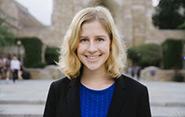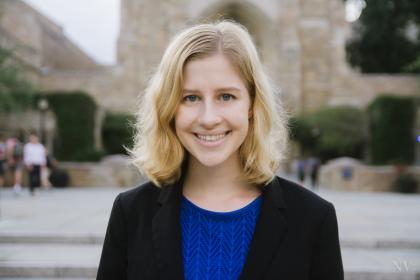Elizabeth Brooks '20 Wins Morse Prize For Engineering Achievement

As a first-year student, Elizabeth Brooks ’20 joined SheCode, a group that teaches computer programming skills to middle and high school girls in the New Haven area. At the time, it was an informal program that, as co-president, Brooks formalized into an official club and secured ongoing funding for.
 It was this kind of immersion into her work as a student and to helping the community beyond Yale for which Brooks recently won the Belle and Carl Morse Prize, awarded to a rising senior in engineering and applied science for outstanding scholarship, extracurricular participation and leadership.
It was this kind of immersion into her work as a student and to helping the community beyond Yale for which Brooks recently won the Belle and Carl Morse Prize, awarded to a rising senior in engineering and applied science for outstanding scholarship, extracurricular participation and leadership.
“Your impressive work as an Undergraduate Learning Assistant for CPSC 223 and CPSC 365 signals a true dedication to engineering that is aligned with this award,” reads the letter notifying her of the award. “Also of note is your active participation in the Society of Women Engineers (SWE), Design for America (DFA), and – most recently – Tau Beta Pi, thereby demonstrating the leadership and well-roundedness of the Y-shaped Engineer.” At Yale, Brooks has served as co-president of SWE and president of DFA. She is vice president of the Yale chapter of Tau Beta Pi, the national engineering honor society.
This is all in addition to an exceptional academic performance. It’s a lot to take on - how does she balance everything?
“It can be difficult, but my philosophy is that I have four years here and there are so many really exciting things going on that I have enjoyed being part of,” she said. “So I just try to do as much as I can, and I think the excitement and newness of everything keeps me going.”
Besides stretching her skills beyond her electrical engineering/computer science major, Brooks said her involvement with clubs allows her to see tangible results outside of the classroom. One example of this is a project with DFA that involved helping doctors at Yale New Haven Hospital communicate better with patients of autoimmune hepatitis, a rare disease for which it can be difficult for patients to find information.
“The doctors didn’t have good, quality handouts, so we worked on one that was medically accurate but also readable,” she said. “We tested it with an online autoimmune hepatitis support community and got feedback from them to make sure we were addressing the main concerns.”
Another benefit to her work out of class is working with people with different backgrounds.
“I work with a lot of engineers, but also a lot of art majors, history majors, and social science majors,” she said. “We all have that community and we’re working together, but we all bring very different things to the table.”

